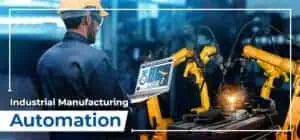
In recent years, industrial Manufacturing Process Automation has witnessed remarkable advancements driven by automation technology. As manufacturers aim to enhance productivity, efficiency, and quality while reducing costs, automation has become an indispensable component of modern manufacturing processes. This blog will delve into the evolving trends in industrial manufacturing automation, focusing on the role of automation technology and its impact on the manufacturing process.
- Integration of Manufacturing Process Automation: The integration of industrial automation has become a cornerstone of modern manufacturing operations. Automation technology, such as programmable logic controllers (PLCs), robotics, and machine learning, enables manufacturers to automate various tasks, streamline processes, and optimize resource utilization. The integration of different automated systems allows for synchronized operations, minimizing downtime, improving overall efficiency, and reducing human error.
- Advanced Robotics and Collaborative Automation: Robotics plays a vital role in modern industrial manufacturing. Traditional robotic systems have now evolved to become more flexible, intelligent, and collaborative. Advanced robotics, such as collaborative robots or cobots, work alongside human operators, enhancing productivity and safety on the factory floor. Cobots are designed to perform repetitive or physically demanding tasks, freeing up human workers to focus on more complex activities that require creativity and problem-solving skills.
- Internet of Things (IoT) and Industrial Automation: The Internet of Things (IoT) has revolutionized various industries, and manufacturing is no exception. IoT devices and sensors provide manufacturers with real-time data and insights into their production processes, enabling predictive maintenance, remote monitoring, and optimized asset utilization. By leveraging IoT technology, manufacturers can achieve greater visibility, proactive decision-making, and improved efficiency throughout the manufacturing value chain.
- Artificial Intelligence (AI) and Machine Learning: Artificial intelligence and machine learning have become crucial components of industrial manufacturing automation. AI-powered systems can analyze vast amounts of data, identify patterns, and make informed decisions in real time. Machine learning algorithms enable predictive maintenance, quality control, and demand forecasting. By leveraging AI and machine learning, manufacturers can optimize production, improve product quality, and reduce costs by identifying inefficiencies and streamlining processes.
- Additive Manufacturing and Automation: Additive manufacturing, commonly known as 3D printing, has gained significant traction in industrial manufacturing. Automation plays a pivotal role in accelerating the adoption of additive manufacturing technologies. Automated systems handle tasks such as material handling, part removal, and post-processing, enabling continuous production and reducing manual labor requirements. The combination of automation and additive manufacturing offers manufacturers increased design flexibility, reduced waste, and improved time-to-market.
- Cybersecurity and Industrial Automation: As industrial manufacturing becomes increasingly connected and digitized, the need for robust cybersecurity measures is paramount. Automation technology relies heavily on interconnected systems, making them vulnerable to cyber threats. Manufacturers must prioritize cybersecurity by implementing measures such as data encryption, network segmentation, and regular system updates. By safeguarding their automation systems, manufacturers can mitigate the risks associated with cyberattacks and protect valuable intellectual property.
Exploring the Emerging Trends in Today’s Industrial Manufacturing Automation
Here are some statistics on the emerging trends in today’s industrial manufacturing automation:
- The global industrial automation market is expected to reach $1.6 trillion by 2025.
- The automotive industry is the largest driver of industrial automation, accounting for over 25% of the market.
- The electronics and electrical industries are the second-largest drivers of industrial automation, accounting for over 20% of the market.
- The manufacturing industry is expected to see the fastest growth in industrial automation, with a CAGR of over 10% from 2020 to 2025.
- The adoption of industrial automation is being driven by the need to improve efficiency, productivity, and quality.
- The use of artificial intelligence (AI), machine learning (ML), and big data is expected to revolutionize industrial automation in the coming years.
Top Manufacturing Industries in Industrial Automation
The top manufacturing industries in industrial automation are:
- Automotive: The automotive industry is one of the largest and most important manufacturing industries in the world. Industrial automation is used in the automotive industry to automate a wide range of tasks, from production to quality control.
- Chemical: The chemical industry is another large and important manufacturing industry. Industrial automation is used in the chemical industry to automate a wide range of tasks, from production to safety.
- Food and beverage: The food and beverage industry is a large and growing manufacturing industry. Industrial automation is used in the food and beverage industry to automate a wide range of tasks, from production to packaging.
- Electronics: The electronics industry is a large and growing manufacturing industry. Industrial automation is used in the electronics industry to automate a wide range of tasks, from production to testing.
- Medical devices: The medical devices industry is a large and growing manufacturing industry. Industrial automation is used in the medical device industry to automate a wide range of tasks, from production to quality control.
These are just a few of the top manufacturing industries that are using industrial automation. As the world becomes more interconnected and globalized, the demand for industrial automation is expected to continue to grow.
Benefits of using industrial automation in manufacturing:
- Increased productivity: Industrial automation can help manufacturers increase their productivity by automating repetitive tasks. This can free up workers to focus on more creative and strategic tasks.
- Improved quality: Industrial automation can help manufacturers improve the quality of their products by reducing human error. This can lead to increased customer satisfaction and repeat business.
- Reduced costs: Industrial automation can help manufacturers reduce their costs by reducing the need for manual labor. This can lead to increased profits and a competitive edge.
- Increased safety: Industrial automation can help manufacturers improve the safety of their workplaces by reducing the risk of accidents. This can lead to a healthier and more productive workforce.
Overall, industrial automation can offer a number of benefits to manufacturers. As the world becomes more interconnected and globalized, the demand for industrial automation is expected to continue to grow.

